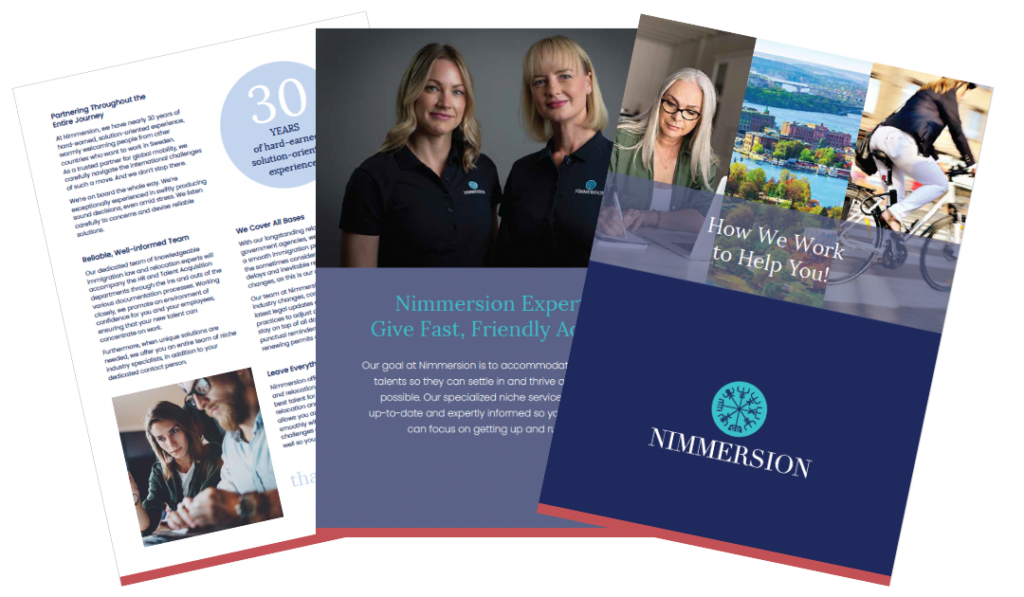Hiring foreign talent in Sweden is subject to specific rules — especially when a work permit is needed.
Firstly, the company must meet the requirements, and then the candidate and, not least, the hiring must follow strict legislation and protocol.
In Sweden, only a Swedish-based company can sponsor work permits, and the company must first qualify as an employer, thus following the Swedish Aliens Act.
Eight Relocation Requirements
For a company to be able to sponsor work permits, it must fulfill several requirements. The company must:
1. Have an address registered in Sweden
2. Be fully registered as a company with the Swedish Tax Authorities.
3. Be registered for F-Tax and VAT with the Swedish Tax Authorities
4. Be registered as an employer with the Swedish Tax Authorities
5. Be active and operating in Sweden
6. Have enough funds to pay potential employees’ salary
7. Comply with any case-by-case additional requested requirements
8. Provide at least one Annual Report from the last TK years. You must also provide TK bank statements.
For newly registered Swedish companies, sponsoring, applying for, and gaining approval for Swedish work permits can be very time-consuming and restrictive. Thus, to get operations up and running, many companies in Sweden choose to work with an EOR (Employer of Record), who takes care of all Swedish employment compliance aspects, including taxes, payroll, employment contracts, and more.
How Long Is The Wait?
Newly founded businesses operating for less than one year are subject to more stringent controls when sponsoring work permits. Furthermore, several industries are additionally subject to rigorous controls, which often leads to lengthy processing times that can sometimes reach four months or longer.
In early 2024, the Swedish Migration Agency revamped its entire process. Applications are now filtered by company, industry, and intended position, sorted under Categories A, B, C, and D.
The candidate and role are categorized under Standard Swedish Classification of Occupation (SSYK) codes. Highly qualified professionals, for instance, have codes that start with 1, 2, or 3. Category A, now sorted by profession, has replaced the Fast Track previously provided to Ombuds and companies.
Perfect Applications Speed Up The Process
The Swedish government has tasked the Migration Agency with prioritizing these applications, and the turnaround should be provided within 30 days. It is important to note that only perfect and complete applications from a legal and process point of view will be handled within the time limit. The applications are automatically screened, and any omission or mistake will place the application in a less prioritized stream that could take many months to process.
The turnaround time for ICT (Intra-Corporate Transfers) and EU Blue Card applications is 90 days. To stay compliant, it’s also important to remember to file the Posted Workers Notification. EU Blue Card holders must sign up for special insurance for the first few months. Note that athletes, au pairs, and seasonal workers fall into Category B, which has unique rules and approval times. Complete applications, however, shouldn’t take longer than 90 days.
Companies with volume recruitment geared toward the green sector located in less populated areas will fall into Category C. While the promised approval time isn’t always shorter if your application is perfect, you could receive approval within 120 days.
Category D is open to several industries under scrutiny, such as construction, the hospitality sector, and cleaning. It’s essential to know that this category has the longest approval times, four months or longer, and is not a priority at the Migration Agency. Category D companies and even highly qualified, sought-after candidates will expect processing times longer than the typical 30 days. The application approval will have to wait longer.
How to Get in the Relocation Fast-track Streams
Let’s say that a construction company offers an architect a job. The role and candidate fall into Category A, and the company falls into Category D, so the turnaround could be four months or longer. Despite being in Category A, the company’s SNI code overrides the role offered, so the approval time will be long. Shortening the period using an EOR may be possible if the SNI code is Category A. A perfect application will shorten it, but there’s no guarantee.
The new model has shown that we typically receive approvals within 30 days; however, this requires perfect applications, which are automatically screened. Category A complete applications are placed in the fast-track stream. However, any omission or mistake will move the application into a less prioritized stream, which can take many months. Furthermore, once an application has fallen into Category C or D, getting it back on the faster track is impossible.
The role must be advertised for ten days before it can be offered to a non-EU national. Four mandatory ínsurances must be signed up for, and while the salary must be on par with the Swedish collective agreements, there is also a threshold.
Even if the salary is high enough for the profession, a threshold is in place with a minimum wage of 27,360 SEK/month. It may be raised to 100% of the median level, which in 2024 is 34,200 SEK/month.
EU Blue Card holders also have a threshold, which in 2024 is 57,450 SEK/month. In addition, the position needs to be advertised. Special healthcare insurance is required for the first few months for longer permits and the full duration if the permit is less than one year.
To Sum it Up…
Companies will benefit from having a recruitment strategy and working closely with a relocation firm specializing in employment-based immigration matters. Asylum law is vastly different. Other solutions are available, and some avenues are closed for refugees who want to change their employment status.
Changes are ahead, and navigating the new long-term and short-term rules is complex. Employment-based immigration law is a niche profession and perhaps even an interest that Nimmersion specialists don’t share with too many in Sweden.
We start by qualifying the company’s standing and determining what possibilities are available based on that. The next question is to consider roles, nationalities, and timing to determine which permit is the best way forward.
Finally, start with the end in mind. Many talents who come to Sweden for an expected 2-3 years end up staying much longer. To ensure the possibility of retaining talent, we advise examining the requirements for permanent residency from the beginning.
Read more about how we work with relocation and Immigration services

Discover how Nimmersion can streamline the relocation and immigration process for your global talent, ensuring a seamless transition and swift integration into Sweden. Our nearly 30 years of experience and dedicated team provide fast, friendly, and reliable support.

